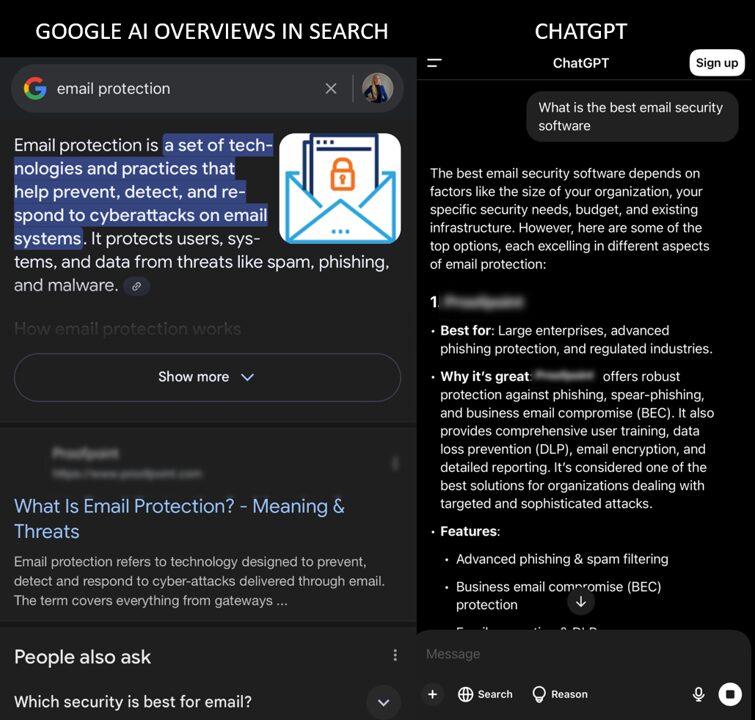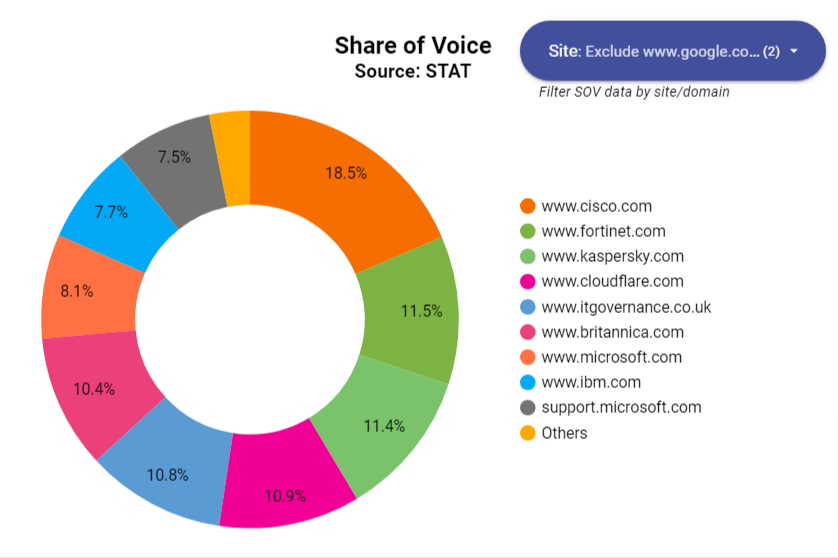The Shift in Search Behavior
Search isn’t declining—it’s evolving.
With the rise of AI-driven search engines and generative AI models, users are finding answers differently. Instead of conducting a Google search and clicking on a website to “read more,” they often get their answers directly from AI-generated summaries. This shift has led to decreased organic traffic, not because SEO is less effective, but because search itself has changed along with user behavior.
Traditional SEO metrics and Key Performance Indicators (KPIs) like Google Search Console Clicks and GA4 Organic Sessions no longer provide a complete picture of performance in 2025 and beyond. To measure SEO success, businesses must rethink their KPIs and focus on visibility, brand awareness, and engagement within generative AI ecosystems.
For a broader perspective on emerging SEO trends, explore our insights on SEO Trends to Watch in 2025.
Understanding Generative Engine Optimization (GEO)
Generative Engine Optimization (GEO) refers to optimizing content to appear in AI-generated search results. Unlike traditional SEO, which focuses on ranking in search engine results pages (SERPs), GEO ensures that a brand’s content is included in AI-driven summaries. These summaries are generated by models like ChatGPT, Gemini, Claude, and Perplexity, which pull information from high-authority sources.
Take a look at the following example:

The example above shows how content surfaced within generative AI models (AI Overviews left and ChatGPT right). Even if users don’t click through, they engage with the brand’s insights, making GEO a critical part of digital strategy.
Check out our blog to learn how to use ChatGPT for SEO.
Rethinking SEO KPIs in 2025 and Beyond
Since traffic patterns are shifting, the way we track performance must change, and we, as SEOs, must adapt. Here are the key metrics and new SEO KPIs that provide a clearer view of brand impact in the era of generative search in 2025 and beyond:
1. New KPI: Impressions from Google Search Console
With zero-click searches on the rise, tracking impressions is more important than monitoring clicks. Impressions show how often content appears in search results, even if users don’t visit the website. This metric provides insight into brand awareness and reach. This metric is invaluable because it gives us a clearer picture of brand visibility and overall reach. It helps us understand how often potential customers see our content, which is essential for gauging brand awareness. In an era where many users get the information they need directly from search results, tracking impressions is key to assessing how effectively our content penetrates the target audience. Below is an example of one of our clients showing how traffic stays flat while impressions are increasing significantly.

2. New KPI: Referral Traffic from Generative Engines
Generative AI models like ChatGPT and Google’s Gemini now act as discovery engines. Therefore, it is important to track referral traffic from these platforms in GA4. Some businesses are already seeing significant increases in visitors from generative sources.

The chart above displays traffic data from two specific sources: Search Generative Experience (SGE) and LLMS. It highlights how these generative engines are contributing to traffic. If we only focus on Google Organic traffic, we risk missing out on these valuable referral sources.
Here are steps to help you set up GA4 to track traffic coming from Generative Search Engines and LLMs. You can create a custom channel group or a new exploration report.
- Create a new Exploration report
- Select Session Source/Medium as a dimension
- Choose Sessions as the metric
- Create a new custom segment
- Add a condition: Session Source, Matches regex, then add the following pattern:
- ^.*ai|.*\.openai.*|.*copilot.*|.*chatgpt.*|.*gemini.*|.*gpt.*|.*x.ai.*|.*grok.*|.*neeva.*|.*writesonic.*|.*nimble.*|.*outrider.*|.*perplexity.*|.*google.*bard.*|.*bard.*google.*|.*bard.*|.*edgeservices.*|.*astastic.*|.*copy.ai.*|.*bnngpt.*|.*gemini.*google.*$
As AI search tools continue to evolve, it’s essential to regularly update this regex pattern to maintain accuracy. (Source: Segmenting AI Traffic in GA4 – Search Engine Land – but we enhanced it further)
Check out our website for more on SEO analytics and how to use it for better performance.
3. New KPI: Share of Voice (SOV)
Share of Voice measures a brand’s presence compared to competitors. It helps assess how much of the conversation a brand owns in organic search and AI-generated results. SOV is calculated based on:
- The number of times a brand appears in search results versus competitors
- The percentage of total visibility within a given topic or industry

Here is an example of Share of Voice within Google organic results.
Tracking Share of Voice allows brands to gauge their overall authority and adjust content strategies accordingly.
The rise of AI Overviews and the broader use of AI tools are really shaking things up in SEO. While we’ve noticed a dip in organic traffic year over year, the number of impressions has shot up quite a bit. Getting featured in an AI Overview and other AI tools is a big deal—it marks you as a go-to source on specific topics and draws more visitors to your site, especially those looking for thorough and nuanced information.
Search metrics are evolving, if you’re ready to see what B2B marketers should measure in a world of AI overviews and generative engines, jump into AI Overviews Are Reshaping B2B Search: What CMOs Need to Know.
The Role of Zero-Click Searches
Zero-click searches occur when users get their answers directly in search results or AI-generated summaries, eliminating the need to click through to a website. This implies that even when organic sessions decrease, the content continues to impact users.
Focusing solely on website traffic as an SEO KPI in 2025 will lead to an incomplete assessment of SEO performance. Instead, businesses should prioritize:
- Brand visibility across search and AI platforms
- How often content gets shown in generative search results
- Engagement levels on AI-driven discovery platforms
Moving Forward with AI-Driven SEO
SEO is no longer just about ranking on Google—it’s about ensuring visibility wherever users search for information. That includes traditional search engines, AI-driven summaries, and other generative models.
To stay ahead, businesses must:
- Optimize content for AI-generated summaries (GEO strategies)
- Track impressions and referral traffic from generative engines
- Measure Share of Voice to understand the market position
- Adapt reporting to reflect new search behaviors
Curious how AI is reshaping search? Discover how AI impacts SEO
So, What’s Next?
- Impressions as a Leading Indicator. While clicks may decline, increasing impressions signals brand authority and discoverability in AI Overviews. Including this data in reporting—alongside a clear narrative—helps clients understand their continued relevance in search. Sidenote: AI-generated summaries may drive traffic differently. Check if more traffic comes from Google Discover or “Other” referral sources in GA4.
- Refining the Organic Value Proposition. AI Overviews favor structured, authoritative content that directly answers user intent. This reinforces the need for well-optimized content that establishes brands as credible sources when users seek deeper insights beyond generative summaries.
- New Opportunities in Search Behavior. AI-generated summaries don’t just impact existing traffic patterns—they also expand how users search. As AI Overviews provide quick answers, they may trigger more long-tail and follow-up searches, creating opportunities for brands that offer in-depth, nuanced content. The key is anticipating these secondary queries and ensuring content is well-positioned to capture them.
- The Shift to Share of Search and Visibility Metrics. Beyond absolute traffic numbers, metrics like share-of-voice, branded search demand, and SERP feature presence become essential in demonstrating SEO’s impact. We should also monitor how AI Overviews cite sources and explore optimizations to increase inclusion.
- Conversion-Driven SEO. As AI Overviews shape new user journeys, ensuring rock-solid conversion tracking is non-negotiable. If organic clicks become more selective, the focus must shift to maximizing value rather than just volume from those visits.
- Strategic Budget Conversations. Some may question whether to reallocate budgets from SEO to paid channels. The reality is that AI Overviews don’t eliminate the need for organic; rather, it is needed even more. Organic remains critical for sustained brand authority, cost-effective acquisition, and long-term search equity.
By focusing on these modern SEO KPIs in 2025 and beyond, brands can maintain relevance and authority in an AI-driven search landscape. Learn how we can help improve your SEO KPIs. Contact us today.





